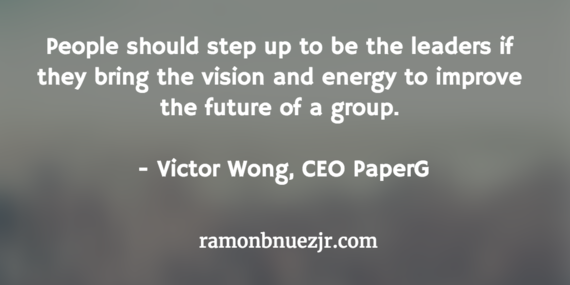Why do you think leaders lead? Let me give you some answers that I have run into:
- To be the boss.
- To chase the next promotion.
- To make more money.
- To gain more status.
Sadly, those answers are standard amongst the majority of our corporate leadership. The responses, above, are focused on one outcome – making you look good; which is sometimes at the expense of your team.
Good leadership is not about adding value to you; it’s a complicated tapestry of adding value to your team.
Victor Wong, CEO of PaperG, not only understands the value of a good product but Wong intimately knows that value begins when a leader adds worth to his people.
Victor is intentional about his leadership strategy:
- Leaders need to bring value to their people.
- Leaders need to show trust before they expect to receive it.
- Leaders must make sure their team is growing in skillset.
- Leaders must teach what they know by empowering others.
So let’s read Victor’s interview. His insights are rather incredible.
The Interview
1. So Victor, what's your story?
I’m an Internet entrepreneur who fantasizes about being a restaurateur or writer but needs to do something far more practical to pay the SF rent. Living in San Francisco these days, it can feel so normal and pragmatic to be founder of a company but I do remember when it wasn’t so common and when it completely captured my imagination.
As a kid growing up in Southern California, I was always fascinated by the Internet revolution in the late 90s. All the world’s knowledge finally brought to everyone’s home and people being connected to each other around the world taught me the power of networks. The companies coming out of that time inspired me to start a few of my own – selling custom computers, websites, and even ads!
As a digital media publisher, I learned quickly that it was hard to sell ads directly to advertisers because they didn’t have digital ads made yet and it was difficult to make them; consequently, I had the insight that if you make it easy to create ads, you can enable publishers to make more money, advertisers to build more ad versions, and consumers to get more relevant ads.
Years later, I started PaperG with that insight. Our 60+ person startup has built a creative management platform for digital advertising which makes it easy for anyone to build, version, and track ads across digital channels like display, social and more. It’s being used by hundreds of enterprise customers like Holiday Inn, Time Warner Cable, and more.
2. Why should leaders lead? And when they do, what is their first responsibility?
People should step up to be the leaders if they bring the vision and energy to improve the future of a group. They have to feel responsible for the outcome and want to do everything to make it positive. Otherwise, they should let someone else step up. Leading for the sake of leading isn’t good for anyone.
That brings me to the first responsibility of a leader, which is making sure the right people are put in the right place. Figuring out among a group who has the right skills and motivations to lead the group or parts of the group is the most critical responsibility. Sometimes you identify yourself and other times there is someone better for a particular role.
Also, the ideal leader changes over time, so constantly assessing the needs of the group is important. It requires a lot of self awareness. Without this alignment of roles and people, a group can’t go anywhere.
3. How does a leader build trust?
Leaders need to create more value than they take. Often, that means taking the risk first or doing more than is required or that an individual gets back. If they can inspire that in everyone that follows them, then everyone benefits, because as a whole, they can create more than the sum of their parts. That’s the power of networks, ecosystems, and community.
Leaders need to demonstrate trust in their people to gain trust. By being first-movers and value makers, not takers, they create better outcomes for everyone, themselves included.
4. How are you making things better for the people who follow you?
At PaperG, we’ve built a strong culture around learning. We provide educational resources like free books and course credits to people looking to invest in and grow their skills. We also have lunch lectures where people share their passions and topics of interest.
We also believe in giving people clear career paths based on their interest whereby we specify what skills are needed to move into new roles and teams. These paths, coupled with opportunities to learn, help our employees grow in experience and skills. By having a more talented team, the whole company is better off and certainly each individual is better off.
5. What are you currently doing to develop your leadership?
The best way to learn something is sometimes to teach it. I’ve been fortunate to have a growing group of emerging leaders in the company that I teach and learn from every day so that we can all be better managers. We’ve been developing teaching modules and sharing best practices with these leaders so that we can all can get better at leading.
Beyond my internal peers, I’ve been lucky to surround myself with board directors and fellow entrepreneur friends who have been through this journey. People even only a few years ahead can really illuminate the path forward.
Visit ramonbnuezjr.com for more content like this + to sign up for my newsletter and receive a free copy of my e-book "The Ultimate Guide To Living On Purpose," about how to live your life on purpose.

